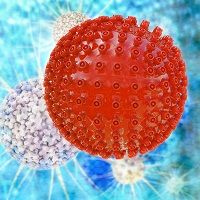Article
"Ophthalmology Finally has a Simple Test that Can Detect HSV Infection.â€
Author(s):
Researchers from the University of Pittsburgh compared the AmpliVue device to existing detection methods for ocular herpes simplex virus, affirming its accuracy and efficiency.

Ocular herpes simplex virus (HSV) is one of the leading causes of infectious corneal blindness in the United States. As with most herpetic viruses, it is quite treatable, but timely detection is necessary to catch the virus before dramatic, vision-impairing scars can occur.
A new study out of the University of Pittsburgh Medical Center, presented this week at the American Academy of Ophthalmology 2016 Meeting in Chicago, makes the case that “ophthalmology finally has a simple test that can detect HSV infection.”
Previous detection methods include cell culture testing, polymerase chain reaction (PCR), and ELVIS testing, though ELVIS, faster and less definitive than the other two, still takes about 24 hours to yield results. For their study, the Pitt researchers sought to verify the timeliness and accuracy of AmpliVue, an FDA-approved handheld molecular diagnostic device, for the detection of HSV.
The study enlisted 39 true-positive specimens and 20 true-negative specimens, all PCR or cell culture verified. Using cell culture positivity as the “gold standard”, AmpliVue noticeably outperformed ELVIS in sensitivity, with consistently high negative predictive and efficiency values and 100% specificity.
The study claims no conflicts of interest and was conducted with the assistance of an NIH Coe Grant. The authors laud how straight-forward and easily interpreted the device’s diagnostic results are, and believe that “ApliVue has office-based potential.” The study was rated a “Best Poster” by the AAO.
Related Coverage
Assessing Rates of Noninfectious Vitritis after Intravitreal Injection of Anti-VEGF Agents
Amsler vs. Casa: Which Test Better Detects Early Wet AMD?
Difluprednate Shows Itself Effective for Intermediate Uveitis Treatment




